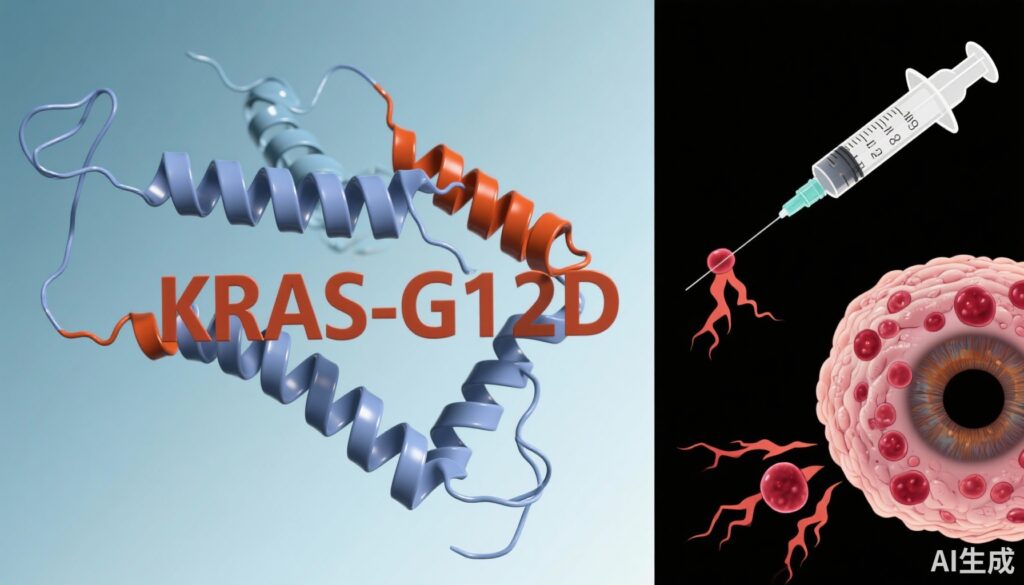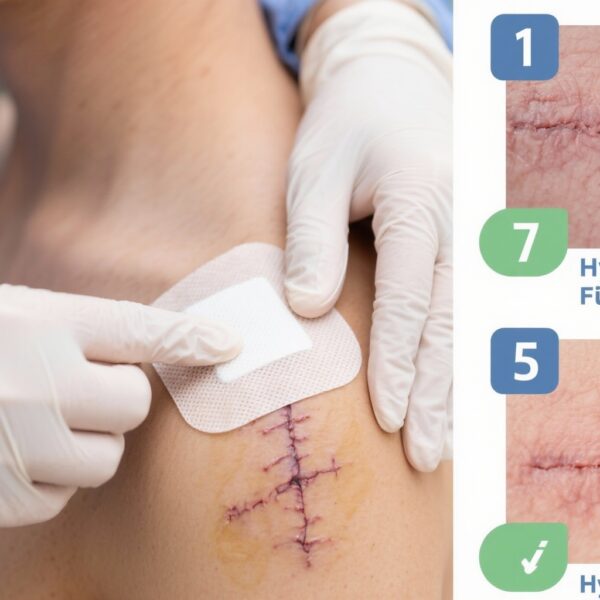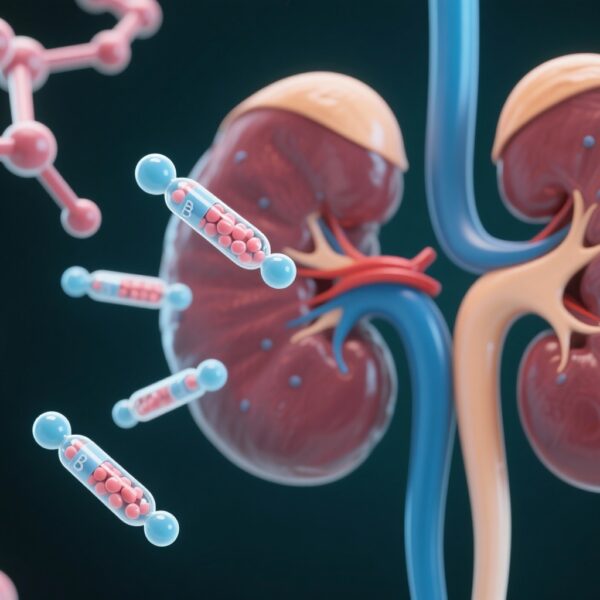Highlight
- VS-7375, a novel oral KRAS G12D inhibitor, demonstrated 80% tumor shrinkage in early phase trials in advanced solid tumors including pancreatic ductal adenocarcinoma, with good tolerability and no dose-limiting toxicities.
- Ozekibart, a four-valent DR5 agonist antibody, significantly improved progression-free survival by over 50% versus placebo in a phase 3 trial of advanced soft tissue sarcoma, marking the first systemic therapy to show clinical benefit in this indication.
- Eli Lilly’s acquisition of Adverum Biotechnologies promises advancement in ocular gene therapy with ixo-vec, a single-dose intravitreal treatment for wet age-related macular degeneration currently in phase 3 trials.
Clinical Context and Unmet Needs
KRAS mutations, particularly the G12D variant, are among the most common oncogenic drivers in solid tumors such as pancreatic ductal adenocarcinoma (PDAC), historically resistant to targeted therapy. Although KRAS G12C inhibitors gained regulatory approval recently, targeting G12D remains a critical unmet need due to its high prevalence and poor prognosis.
Soft tissue sarcomas, including advanced or metastatic forms, have limited systemic treatment options with minimal durable responses. There is an urgent need for therapies that extend progression-free survival (PFS) while maintaining quality of life.
Wet age-related macular degeneration (wAMD) is a leading cause of irreversible vision loss in the elderly, treated primarily with repeated intravitreal anti-VEGF injections. Gene therapies offering durable expression of VEGF inhibitors promise to reduce treatment burden and improve outcomes.
Study Designs and Interventions
VS-7375 Phase 1/2a (VS-7375-101) Trial: This first-in-human multi-cohort study evaluates the safety, tolerability, pharmacokinetics, and preliminary efficacy of VS-7375, a non-covalent oral KRAS G12D ON/OFF inhibitor, dosed once daily at 400 mg, 600 mg, and currently 900 mg. Subjects include patients with advanced solid tumors such as PDAC. Tumor response is assessed by imaging per RECIST criteria.
Inhibrx ChonDRAgon Phase 3 Trial: A randomized, placebo-controlled study enrolling 206 patients with advanced or metastatic, unresectable soft tissue sarcoma. Patients randomized to ozekibart or placebo, with PFS as the primary endpoint assessed by blinded independent review. Secondary endpoints include disease control rate, symptom progression, and safety.
Adverum Ixo-vec ARTEMIS Phase 3 Trial: A pivotal trial evaluating a single intravitreal injection of ixo-vec, an aflibercept-expressing gene therapy, in patients with wet AMD, measuring visual function, injection frequency, and safety. The therapy has received FDA Fast Track, RMAT, and EMA PRIME designations.
Results and Clinical Implications
VS-7375 Results: Among five evaluable patients with baseline and subsequent imaging, four (80%) showed tumor shrinkage across multiple tumor types, including late-stage pancreatic ductal adenocarcinoma. The drug was well tolerated without dose-limiting toxicities at 400 mg and 600 mg doses; common adverse events such as nausea, vomiting, or diarrhea were mild (grade 1 or lower). The study is ongoing with escalation to 900 mg and a first-in-human combination cohort with cetuximab.
Mechanistically, VS-7375 binds KRAS G12D in both its active (GTP-bound) and inactive (GDP-bound) states via non-covalent interaction, effectively disrupting downstream signaling pathways critical for tumor cell proliferation, which may explain its antitumor activity.
Ozekibart in Soft Tissue Sarcoma: The ChonDRAgon trial met its primary endpoint with a highly significant improvement in PFS: median PFS was 5.52 months versus 2.66 months with placebo (HR=0.479, 95% CI 0.33–0.68, P<0.0001), representing a 52% risk reduction in progression or death. Benefits were consistent across subgroups including IDH mutation status. Secondary endpoints such as disease control rate (54% vs 27.5%) and delayed symptom progression further corroborated efficacy. Safety was acceptable with no major concerns reported.
Ozekibart is a four-valent DR5 agonist antibody designed to induce apoptosis by activating death receptor 5 (DR5), a mechanism that offers a novel therapeutic avenue in sarcomas, a disease group historically without approved systemic options.
Adverum’s Ixo-vec Gene Therapy: Ixo-vec is designed for a single intravitreal administration that enables sustained intraocular production of aflibercept, aiming to reduce or eliminate the need for frequent anti-VEGF injections in wAMD. The therapy is currently in phase 3 ARTEMIS trial with regulatory designations signaling its potential to fill an important therapeutic gap. Successful demonstration of long-term efficacy and safety could represent a paradigm shift in ophthalmology.
Expert Commentary
The early clinical data around VS-7375 are particularly promising given the historically “undruggable” nature of KRAS G12D mutations. The ability to inhibit both ON and OFF states non-covalently and the favorable safety profile align with an emerging trend toward highly selective, orally bioavailable KRAS inhibitors expanding the arsenal against pancreatic cancer and other difficult-to-treat solid tumors.
The positive PFS and disease control results with ozekibart in advanced soft tissue sarcoma are groundbreaking, addressing a large unmet need and potentially setting a new standard of care. This study underscores the relevance of targeting death receptors in oncology and the feasibility of antibody therapeutics in sarcoma.
The acquisition of Adverum by Eli Lilly highlights the strategic importance of innovative gene therapies for chronic ophthalmic diseases. Ixo-vec’s development illustrates advances in vector design and gene expression control that could profoundly impact patient quality of life.
Conclusion
The recent clinical advances in KRAS G12D inhibition, DR5 agonism, and ocular gene therapy represent notable milestones in oncology and ophthalmology. VS-7375’s initial tumor shrinkage and tolerability profile support continued investigation as a potential best-in-class KRAS G12D inhibitor. Ozekibart’s registered PFS benefit marks the first significant systemic treatment improvement for soft tissue sarcomas. Meanwhile, the therapeutic promise of Ixo-vec offers hope for more durable and convenient wet AMD management. Ongoing trials and regulatory reviews in the coming years will determine how these agents integrate into clinical practice and ultimately improve patient outcomes.
Funding and Clinical Trials Registration
VS-7375 trials are sponsored by Verastem Oncology. Inhibrx sponsors the ChonDRAgon phase 3 trial (NCT number not disclosed). Adverum’s ARTEMIS trial is supported by Eli Lilly following acquisition. Regulatory designations include FDA Fast Track and RMAT for ixo-vec, and EMA PRIME status.
References
- Canon J, et al. The clinical KRAS(G12C) inhibitor AMG 510 drives anti-tumour immunity. Nature 2019; 575:217–223.
- D’Angelo SP, et al. Olaratumab/cyclophosphamide in advanced soft tissue sarcoma: results from a phase 2 study. J Clin Oncol 2017; 35(15_suppl):11000.
- Khanani AM, et al. Durability of Aflibercept Expression from Gene Therapy Vector in Wet AMD. Ophthalmology. 2021;128(5):711-720.



